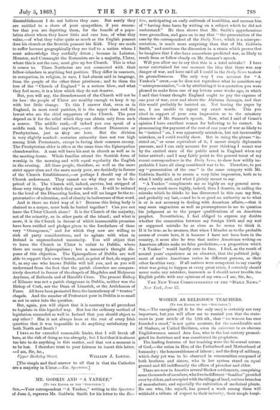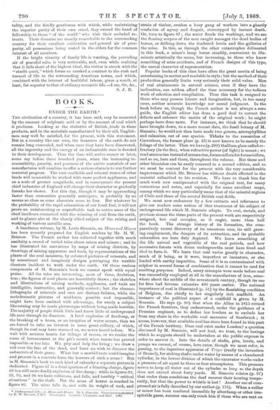WOMEN AS RELIGIOUS TEACHERS.
[TO THE EDITOR OF THE "SPECTATOR."]
SIR,—The exception (if it be the only one) is certainly not very important, but you will allow me to remind you that the state- ment in your article of the 12th ult., that " no Woman has ever founded a creed," is not quite accurate, for the considerable sect of Shakers, or United Brethren, owes its existence to an obscure Englishwoman named Ann Lee, who in the last century promul- gated its doctrines and was constituted its prophetess.
The leading features of her teaching were the bi-sexual nature of God,—the union in Him of the Fatherhood and Motherhood of humanity ; the honourableness of labour ; and the duty of celibacy, which duty yet was to be observed in communities composed of both brethren and sisters, who in her system stand on equal ground and fill indifferently the offices of preacher and elder.
There are now in America several Shaker settlements, comprising some thousands of members, who live in different "families" presided over by elders, and occupied with the tillage of land, various branches of manufacture, and especially the cultivation of medicinal plants. No one who, like myself, has passed a week among them will withhold a tribute of respect to their industry, their simple hospi- tality, and the kindly gentleness with which, while maintaining the superior purity of their own creed, they extend the hand of fellowship to those "of the world" who visit their secluded re- treats. Their domains are usually remarkable in the surrounding country for their excellent cultivation and general air of pros- perity, all possessions being vested in the elders for the common interest of all members.
If the bright vivacity of family life is wanting, the pervading air of peaceful calm is very noticeable, and, even while realizing that it falls short of the highest ideal, the visitor is struck with the "starlit quiet," which forms so marked a contrast to the rush and turmoil of life in the surrounding American towns, and which, combined with the interest of healthful labour, gives a result, at least, far superior to that of ordinary monastic life. —I am, Sir, &c., S. J. B.































 Previous page
Previous page